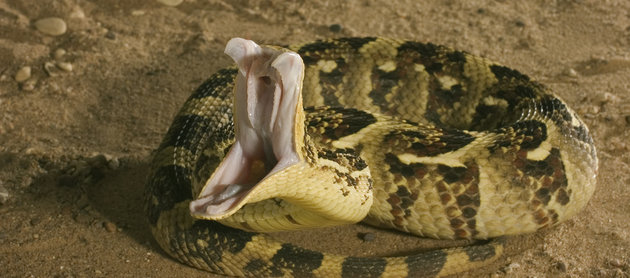Tens of thousands of lives are in danger.
We’re about to run out of Fav-Afrique, the most effective antivenom for snakebites in sub-Saharan Africa, Doctors Without Borders warned on Monday. This could imperil the lives ofthe 1.5 million people who are bitten by a snake in the region every year.
Fav-Afrique has been the antivenom of choice for the 10 potentially deadly snakebites for years, but it’s very expensive. A course of treatment can cost up to $500 — more than the average annual income in some sub-Saharan African countries. Governments and NGOs subsidized the treatment, but that wasn’t enough to make producing Fav-Afrique profitable, the company behind the antivenom, Sanofi Pasteur, told the AP.
That’s why Sanofi Pasteur announced in 2010 that they would be ceasing production of Fav-Afrique in 2014. They did — and now the stock of the drug is set to expire in June 2016.
“We are now facing a real crisis, so why do governments, pharmaceutical companies and global health bodies walk away when we need them most?” Gabriel Alcoba, a snakebite expert affiliated with Doctors Without Borders, said in a statement.
Snake antivenom is notoriously difficult and expensive to produce. To make it, pharmaceutical companies give venom, milked from poisonous snakes, to large mammals such as sheep and horses, then extract the animal’s blood and refine out antibodies to the venom. Though Sanofi is negotiating with another company to take over production of Fav-Afrique, the soonest the other company could start doing so is 2018.
Until then, there are a few alternatives, renowned snakebite expert Dr. Sean Bush of East Carolina Univeristy told The Huffington Post. Several other companies produce antivenoms for bites from snakes in sub-Saharan Africa that are less effective, and more prone to causing allergic reactions, than Fav-Afrique. Bush also said that in some cases, antivenoms can be used beyond their expiration date; in America, the entire stock of the best coral snake antivenom has expired, but testing has shown that it still works several years later.
“Expiration, when it comes to an immunological treatment, is kind of a relative term,” Bush said. “It can keep working for a while. So we don’t need to panic quite yet.”
Still, Bush said that the looming shortage of Fav-Afrique highlights the massive disparities between the treatment of snakebites in the developed and developing world. In the United States, an average of only five of the 8,000 people who get bitten by a venomous snake each year die; this suggests, in the American imagination, that snakes aren’t very dangerous.
In fact, Bush said, “Snakes are the most dangerous animal in the world. They kill more people than all other animals combined.”
About a quarter of the approximately 100,000 deaths by snakebite that occur each year happen in sub-Saharan Africa. And about 30,000 people in sub-Saharan Africa require amputations because of snake venom every year. But that’s not because the snakes there are more deadly than here, Bush said. Though sub-Saharan Africa is home to the feared Black Mamba snake, one of the deadliest in the world, in addition to puff adders and several types of deadly cobra, these are broadly comparable to the worst of the snakes in North America, such as rattlesnakes, cottonmouths and coral snakes.
“Snakes are pretty dang deadly here,” Bush said. “It’s just that if we get bitten by one, we can punch 911, take a helicopter to the hospital and get antivenom within the hour, and they often can’t.”
Access to emergency medicine in general is far worse in Africa, and stocks of antivenom on the continent, in particular, fall far short of the requirements. A recent study found that the amount of antivenom in sub-Saharan Africa fell from about 200,000 doses in the early 1980s to about 20,000 doses today. The expiration of the stock of Fav-Afrique makes this already dire — and deeply unjust — situation worse.
Source: Joe Satran, Huffington Post




